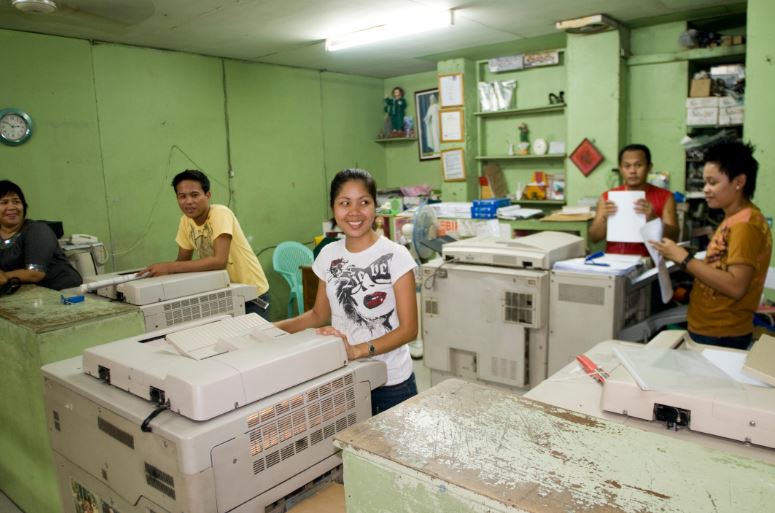
Increasing opportunities for youth employment in the Philippines

Context
The 2013 World Bank Development Report on jobs identified youth unemployment as a key barrier to growth amongst low- and middle-income countries. In the Philippines, approximately 17 per cent of youth 15 to 24 years old are unemployed and account for nearly half of the unemployed persons in the labour force. The challenge of finding work is particularly pronounced for individuals who do not graduate high school.
Since 1993, DOLE, through the SPES, has tried to increase high-school graduation rates and improve employability amongst graduating students. The SPES aims to link youth from low-income households – either enrolled in schools or out of school – to formal work opportunities at decent wages during their school breaks. The employers (public and private) are offered a 40 per cent wage subsidy. DOLE collaborates with the provincial and municipal Public Employment Service Offices (PESO) in implementing the programme.
In 2015, 3ie partnered with Innovations for Poverty Action to conduct a process and impact evaluation to assess the effectiveness of the SPES. The study measured how the SPES affected academic outcomes, youth employability measured by labour market perceptions, and employment and job-search efforts. Applicants randomly chosen to participate in the SPES formed the treatment group. The remainder, who were not invited to participate, formed the control group.
Evidence
Findings showed that although the SPES did not have an impact on education outcomes such as school enrolment, graduation and grades in the medium run, it did increase enrolment for men, who were at higher risk of dropping out of school.
In terms of employability, the SPES did not have an impact on life skills or self-esteem. Aside from answering phones and bookkeeping, the SPES did not improve relevant work skills amongst the participating youth. Although it did improve participants’ confidence about their work prospects after graduation, it did not affect their perception of earning improved wages.
The most promising impact of the programme was on employment outcomes. Participation in the SPES increased the likelihood of being employed (at the time of the study) with a private employer, local government unit or NGO, compared to the control group (70% increase). However, despite the positive impact on employment, the cost of the SPES to DOLE was high – approximately US$1,920 per job found.
Evidence impacts
Type of impact: Inform discussions of policies and programs
When subsequent phases of the evaluated programme or policy draw from the findings of the evaluation or review, and/or the study team participates in informing the design of a subsequent phase.
This is one of 3ie’s seven types of evidence use. Impact types are based on what we find in the monitoring data for an evaluation or review. Due to the nature of evidence-informed decision-making and action, 3ie looks for verifiable contributions that our evidence makes, not attribution.
Read our complete evidence impact typology and verification approach here.
Close windowResearchers presented the evaluation evidence at the 17th National PESO Congress in October 2017. More than 800 participants attended, including DOLE Regional Office SPES focal persons, the Bureau of Local Employment and senior DOLE officials as well as nationwide PESO managers and staff who implement SPES.
Evaluation findings reinforced DOLE’s view of recasting SPES as a work support programme and adding a life skills training component. Following amendments to the SPES law in 2016, DOLE increased the working days from 52 to 78 days and wage subsidy to employers to 60 per cent (from an earlier 40 per cent) in low income local government units so that SPES can better target poorer participants.
In recent years, DOLE refocussed SPES with added emphasis on improving youth employability. DOLE is also working towards increasing private sector participation for better on-the-job learning experience. According to the study, a majority of the current SPES participants are engaged in administrative tasks as part of their jobs at the local government units.
‘I think one good thing about the impact evaluation is really realising [the importance] of strengthening our monitoring and evaluation system, because that is where we are very weak within so many competing tasks at the bureau level and also at the regional level. So, that needs to be strengthened. We also see the value of having [other programmes] evaluated as well, as we have experienced in our SPES programme.’
Suggested citation
International Initiative for Impact Evaluation (3ie), 2020. Strengthening support for youth employment in the Philippines [online summary], Evidence Impact Summaries. New Delhi: 3ie.
Related
The impact of a youth employment bridging program in the Philippines
Innovations for Poverty Action’s study summary on the intervention
Evidence impact summaries aim to demonstrate and encourage the use of evidence to inform programming and policymaking. These reflect the information available to 3ie at the time of posting. Since several factors influence policymaking, the summaries highlight contributions of evidence rather than endorsing a policy or decision or claiming that it can be attributed solely to evidence. If you have any suggestions or updates to improve this summary, please write to influence@3ieimpact.org